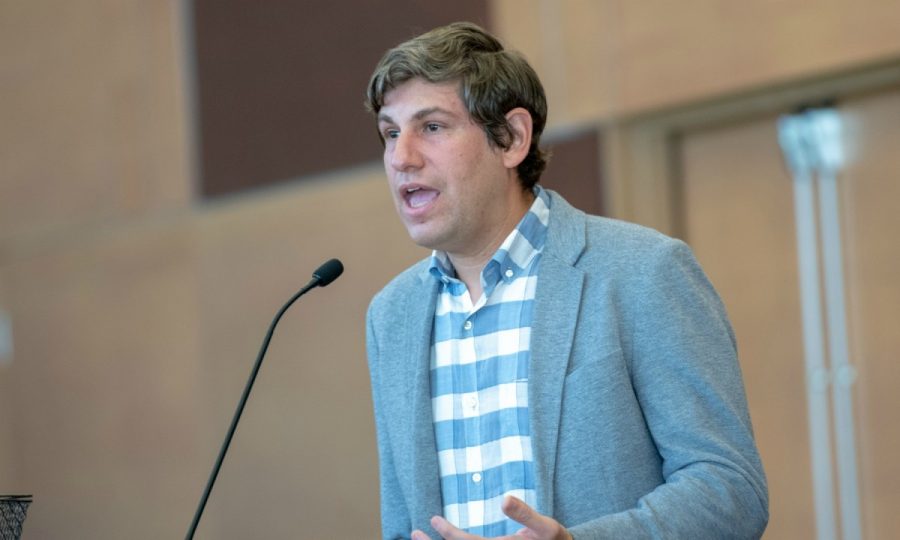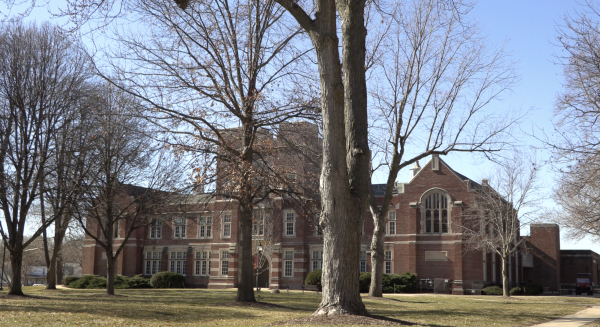Journalist addresses future of voting rights in McBride Lecture
October 4, 2018
INDIANOLA—Twenty-three states, including Iowa, enacted voter ID laws since the 2010 elections, a fact which has a senior reporter for Mother Jones magazine worried.
Ari Berman, an Iowa native, journalist and author of “Give Us the Ballot: The Modern Struggle for Voting Rights in America,” delivered Simpson College’s 31st annual McBride Lecture Wednesday afternoon in Hubbell Hall.
Berman, who grew up about 90 minutes away in Fairfield, Iowa, spoke to an audience of roughly 200 people about current threats to voting rights in Iowa and across the country.
It was after the 2010 midterm elections that Berman started paying closer attention to voting rights because, he said, “a bunch of states, including Iowa, flipped from blue to red and had different people in control. And all of a sudden, we saw a wave of new attempts to make it harder to vote.”
Those attempts included legislation passed by various state governments that either required strict forms of voter ID, eliminated or reduced early voting periods, purged voter registration rolls, made it harder to register to vote or took away voting rights from former felons.
Berman said some laws specifically targeted college students.
“So in Texas, for example, under their voter ID law, you could vote with a handgun permit but not a student ID,” he said. “In other places, polling sites were closed on college campuses.”
He also mentioned some college campuses, including Simpson’s, were split into multiple different voting precincts, a move he said was done intentionally to confuse would-be college voters.
Berman said he believed Republican-controlled state legislatures enacted these voting laws in response to the 2008 election, which saw 5 million new voters, the majority of whom were from ethnically diverse backgrounds.
“And these groups voted 75 percent for President Obama,” he said. “So you had the fastest growing demographics in the country overwhelming voting to elect the first black president. And I think the people that were on the other end of the equation saw that as a wake-up call.”
Berman said instead of changing their policies to appeal to Democratic voters or trying to turn out people who did not vote, GOP legislators resorted to “a very old strategy in American politics, which is you try to make it harder for those people that disagree with you to participate in the political process in the first place.”
“And that unfortunately is what we have seen in recent years,” he added.
Berman referenced a story he wrote for The Nation magazine in April 2016 about a 58-year-old African-American man named Eddie Lee Holloway Jr. who moved from Illinois to Wisconsin in 2008.
Holloway didn’t have trouble voting in Wisconsin—until the state passed a voter ID law in 2011.
Berman recounted how Holloway had to travel back to Illinois to fix a clerical error with his birth certificate and track down high-school and vaccination records. However, the journey ultimately ended with him still not becoming eligible to vote.
As Berman’s worded it in the article, “He’d spent $200, visited two states, and made seven trips to different public institutions, but still couldn’t vote in Wisconsin.”
He also said that after the U.S. Supreme Court declared part of the Voting Rights Act unconstitutional in 2013, states were allowed to pass more sweeping voter ID laws.
Berman referenced a sweeping voter ID law that was passed in North Carolina shortly afterward which also cut back early voting, early pre-registration for 17-year-olds and same-day voter registration.
However, he said that law was later challenged in an appeals court because, according to the court ruling, it targeted African-American voters “with almost surgical precision.”
Although that law was later struck down, Berman said other voter ID laws persist in other states—including Iowa.
For example, Berman mentioned how Iowa passed a voter ID bill in 2017 which required a valid form of ID at the polls. The state also takes away voting rights from convicted felons.
Berman said the voter ID law passed—despite the fact that Iowa has seen very few cases of voter fraud. He explained that Iowa’s secretary of state, Paul Pate, has even acknowledged that fact but still believes widespread fraud could happen.
However, the only example Berman cited of voter fraud in Iowa was when one woman voted twice for Donald Trump in 2016 out of fear the election was rigged in favor of Hillary Clinton. The woman was later arrested and pleaded guilty to election misconduct.
Berman said voter fraud is generally rare because of the risks involved, which include fines, community service, jail time and the loss of voting rights.
“We have enough problems getting people to vote at all in this country, let alone to vote once, twice, three, 10 times,” he added.
To change problems regarding voting restrictions, Berman encouraged audience members to exercise their own right to vote and elect people who are committed to expanding rather than limiting voting rights.
He said restoring voting rights isn’t necessarily a partisan issue either. For example, he mentioned a ballot initiative in Florida that would restore voting rights to former felons. Currently, the measure has 74 percent support, including from a majority of Republicans.
“The last thing I’ll say is that your vote really does matter,” Berman said. “And I know that’s a cliché. People hear that all the time.”
He explained that since elected officials know who is more likely to vote, they know which issues to talk about to appeal to them. Since young people are less likely to vote, candidates are therefore less likely to talk about issues that matter to them. If young people voted in greater number, however, candidates would do better about addressing issues important to them.
“Someone thinks your vote has power, otherwise they wouldn’t try to put up barriers to stop you from voting,” he said.

















